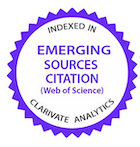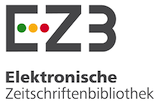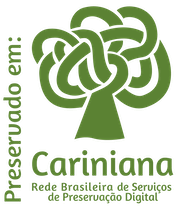Eficácia clínica da auto-hemoterapia como adjuvante no controle de nematódeos gastrointestinais em ovinos naturalmente infectados
DOI:
https://doi.org/10.1590/1809-6891v22e-69931Resumo
Este estudo objetivou avaliar os efeitos da auto-hemoterapia como adjuvante no controle de nematódeos gastrointestinais em ovinos. Quatro grupos experimentais foram formados: G1, 10 animais que receberam sangue venoso autólogo; G2, 10 animais que receberam sangue venoso autólogo e vermífugo contendo levamisol; G3, 10 animais que receberam somente vermífugo contendo levamisol; e G4, 10 animais do grupo controle, que não receberam tratamento. Realizamos contagem de ovos nas fezes (ovos por grama, OPG) de estrongilídeos, cultivo de larvas, hemograma, leucograma e dosagem de proteína sérica antes do início do tratamento (D0) e nos dias 14 (D14) e 42 (D42). Houve uma diminuição significativa no OPG dos grupos que receberam levamisole (G2 e G3) do D14 até o final do período experimental. Ao final das avaliações, o OPG médio de G2 e G3 foi significativamente menor do que G1 e G4. O gênero de nematódeo mais comumente encontrado foi Haemonchus (88%) e o menos foi Trichostrongylus (1%). O teste de Redução na Contagem de Ovos nas Fezes (RCOF) de G2 e G3 no D14 foi 98,1% e 97,9%, respectivamente, entretanto, no G1, o RCOF foi zero nos dois dias avaliados. G1 e G2 mostraram aumento significativo na contagem de monócitos em D14 e D42. Houve um aumento significativo nos valores do hematócrito e hemoglobina em G2 e G3, entretanto, um aumento significativo no valor absoluto de hemácias foi observado somente em G2. Duas doses de autohemoterapia em intervalos de 21 dias, administradas isoladamente ou como adjuvante do levamisole, não é eficaz no controle de nematóides gastrintestinais em ovinos naturalmente infectados.
Palavras-chave: sangue autólogo total; RCOF; isoterapia; levamisol; pequeno ruminante.
Downloads
Referências
IBGE. Instituto Brasileiro de Geografia e Estatística; Censo Agropecuário 2019. [cited 2021 jul 20]. Available from: https://www.ibge.gov.br/estatisticas/economicas/agricultura-e-pecuaria/9107-producao-da-pecuaria-municipal.html?=&t=resultados.
DERAL – Departamento de Economia Rural, Divisão de Conjuntura Agropecuária. Boletim semanal, 03/2021-22 de janeiro de 2021. cited 2021 aug 2]. Available from: https://www.agricultura.pr.gov.br/Pagina/Conjuntura-Boletim-Semanal-032021
Echevarria F, Borba MFS, Pinheiro AC, Waller PJ, Hansen JW. The prevalence of anthelmintic resistance in nematode parasites of the sheep in Southern Latin America: Brazil. Veterinary Parasitology. 1996;62:199-206. English. Available in: https://doi.org/10.1016/0304-4017(95)00906-X
Arosemena NAE, Bevilaqua CML, Melo ACF, Girão MD. Seasonal variations of gastrointestinal nematodes in sheep and goats from semi-arid areas in Brazil. Revue de Médecine Vétérinaire. 1999;11: 873-876. English. Available in: https://agris.fao.org/agris-search/search.do?recordID=FR2000000679
Rashid M, Rashid MI, Akbar H, Ahmad L, Hassan MA, Ashraf K, Saeed K, Gharbi MA systematic review on modelling approaches for economic losses studies caused by parasites and their associated diseases in cattle. Parasitology. 2019;146:129–141. English. Available in: https://doi.org/10.1017/S0031182018001282
Estrada-Reyes ZM, Tsukahara Y, Amadeu RR, Goetsch A., Gipson TA, Sahlu T, Puchala R., Wang Z, Hart SP, Mateescu RG. Signatures of selection for resistance to Haemonchus contortus in sheep and goats. BMC Genomics, 2019;20:735. English. Available in: http://dx.doi.org/10.1186/s12864-019-6150-y.
Dos Anjos C, Silva BT, Fertonani LHS, Silva CS, Matsumoto LS, da Silva RMG, Mello-Peixoto ECT. Pomegranate extracts on larval inhibition of Haemonchus spp and Cooperia spp obtained from cattle. Bioscience Journal. 2006;32(5):1277-1285. English. Available in: https://doi.org/10.14393/BJ-v32n5a2016-30217
Holsback L, Porto PP, Marquez ES, Porto EP. Phyto-biotherapy to control gastrointestinal nematodes of sheep. Semina: Ciências Agrárias. 2013.34(6):3841-3850. English. Available in: http://www.redalyc.org/articulo.oa?id=445744138013
Castro LLD, Sprenger LK, Madrid IM, Oliveira FC, Oliveira PA, Castro LM, Berne MEA, Leite FPL. Efeito in vitro e in vivo de extratos de Eugenia uniflora em nematódeos gastrintestinais de ovinos. Ciência Animal Brasileira. 2019;20:1-12. Portuguese. Available in: https://doi.org/10.1590/1089-6891v20e-49037
Vilela VLR, Feitosa TF, Braga FR, Santos AD, Bezerra RA, Silva GLL, Athayde ACR, Araujo JV. Use of Duddingtonia flagrans in the control of gastrointestinal nematodes of feedlot goats. Semina: Ciências Agrárias. 2020;41:915. English. Available in: https://doi.org/10.5433/1679-0359.2020v41n3p915
Holsback L, Lima HE, Porto PP, Marquez ES, Zacarias FGS, Porto EP. Biological control of nematodes by nematode trapping fungi Duddingtonia flagrans in naturally infected sheep in Southern Brazil. German Journal of Veterinary Research. 2021; eISSN:2703-1322:17-26. English. Available in: https://doi.org/10.51585/gjvr.2021.2.0010
Meeusen E. Rational design of nematode vaccines; natural antigens. International Journal for Parasitology. 1996;26(8-9):813-818. English. Available in: https://doi.org/10.1016/S0020-7519(96)80046-4
Butter NL, Dawson JM, Wakelin D, Buttery PJ. Effect of dietary tannin and protein concentration on nematode infection (Trichostrongylus colubriformis) in lambs. The Journal Agricultural Science. 2000;134: 89-99. English. Available in: https://doi.org/10.1017/S0021859699007315
David AC. A auto-hemoterapia nas dermatoses (Tese online). Portugal: Faculdade de Medicina do Porto; 1924. English. Available in: http://repositorio-aberto.up.pt/ bitstream/10216/17607/3/210_2_FMP_TD_I_01_P.pdf
Shakman, S.H. Autohemotherapy Reference Manual. Definitive Guide and Historical Review from Bloodletting to Stemcells. Institute of Science www.InstituteOfScience.com; United States of America; 2010. p. 177-179. English.
Gottheil WS, Satenstein DL: The autoserum treatment in dermatology. JAMA. 1914, English. 63:1190-1194. 10.1001/jama.1914.02570140044014 English. Available in: https://doi.org/10.1001/jama.1914.02570140044014
Mori O, Hashimoto T. Autologous whole blood intramuscular injection as a cure for chronic urticaria: report of a patient in whom intradermal injection of autologous serum continued to cause a weal-and-flare response. British Journal of Dermatology. 1999;140(6):1192-1193. English. Available in: https://pubmed.ncbi.nlm.nih.gov/10354108/
Staubach P, Onnen K, Vonend A, Metz M, Siebenhaar F, Tschentscher I, Opper B, Magerl M, Lüdtke R, Kromminga A, Maurer M. Autologous whole blood injections to patients with chronic urticaria and a positive autologous serum skin test: A placebo-controlled trial. Dermatology. 2006; 212:150-9. English. Available in: https://doi.org/10.1159/000090656
Schäfer T. Epidemiology of complementary alternative medicine for asthma and allergy in Europe and Germany. Annals of Allergy, Asthma & Immunology. 2004;93:S5-S10. English. Available in: https://doi.org/10.1016/S1081-1206(10)61481-0
Cortés-Ros OM, Oliveira AS, Figueiredo FNM, Batista MRC, García LP, Olivares AMO. Tratamiento de la Psoriasis vulgar com Autohemoterapia menor. Hospital “Celia Sánches Manduley”. 2016-2018. Multimed Revista Médica. 2019;23(4):758-774. Spanish. Available in: http://scielo.sld.cu/ scielo.php? script=sci_arttext&pid=S1028-48182019000400758&lng=es&nrm=iso&tlng=es
dos Anjos DA, Assis MF, Martins RR, Tomacheuski RM, Taffarel MO. Evaluation of hemoacumpuncture in the treatment of dogs with trhombocitopenia. Journal of Veterinary Science and Public Health. 2020;7(2): 112-118. English. Available in:
https://doi.org/10.4025/revcivet.v7i2.42405
Quessada AM, Carvalho CJS, Oliveira RN, Costa PM, Barbosa SRV, Sousa e Silva SMM. Auto-hemoterapia como adjuvante no tratamento de mastocitoma em cão: relato de caso. Revista Brasileira de Ciências Veterinárias. 2010;17(3/4):108-110. Portuguese. Available in: http://dx.doi.org/10.4322/rbcv.2014.153
Borges OMM, Souza AP, Mendes RS, Araújo KN, Torres LM, Dantas AKFP. Clinical Effectiveness of Autohemotherapy as an Adjuvant Treatment of Canine Parvovirus. Acta Scientiae Veterinariae. 2014;42:1224. English. Available in: http://www.ufrgs.br/actavet/42/PUB%201224.pdf
Bambo O, Cardoso JMM, Dimande A, Mapatse M, Santos IFC. Auto-hemoterapia no tratamento da papilomatose oral canina – Relato de caso. MedVep Dermato – Revista de Educação Continuada em Dermatologia e Alergologia Veterinária. 2012;2(2):39-43. Portuguese. Available in: https://pesquisa.bvsalud.org/portal/resource/pt/vti-11395
Borges OMM, Araújo CLM, Ramalho GC, Silva RMN, Tanikawa A, Souza AP. Effects of Autohemotherapy on Hematologic Parameters and Morphology of Canine Oral Papilomatosis. Acta Scientiae Veterinariae. 2017;45(1):211. English. Available in: http://www.ufrgs.br/actavet/45-suple-1/CR_211.pdf
Dhule SJ. Auto-hemotherapy for Management of Caprine Papillomatosis. Intas Polivet. 2013; 14(II):425-426. English. Available in: https://www.indianjournals.com/ijor.aspx?target= ijor:ipo&volume=14&issue=2&article=091
Ranjan R, Ghumman SPS, Bhatt GR, Singh RS. Efficacy of Autogenous Vaccine and Auto-hemotherapy in Bovine Cutaneous Papilomatosis. Intas Polivet. 2013;14(II):411-414. English. Available in: https://www.indianjournals.com/ijor.aspx?target=ijor:ipo&volume =14&issue=2&article=086
Kavithaa NV, Rajkumar NV, Jiji RS. Papillomatosis in Jersey cows and its different medical treatment. International Journal of Science, Environment. 2014;3(2):692-694. English. Available in: https://www.ijset.net/journal/297.pdf
Nehru PA, Sunandhadevi S, Rama T, Muniyappan N. Efficacy of Auto-Hemotherapy in Bovine Teat Papillomatosis: A Case Report. Advances in Animal and Veterinary Sciences. 2017;5(8):350. English. Available in: http://dx.doi.org/10.17582/journal.aavs /2017/5.8.350.351
Mettenleiter MW. Autohemotransfusion in preventing postoperative lung complications. American Journal of Surgery. 1936;XXXII(2): 321-323. English. Available in: https://doi.org/10.1016/S0002-9610(36)90155-1
Olwin JH, Ratajcazak HV, House RV. Successful Treatment of Herpetic Infections by Autohemotherapy. The Journal of Alternative and Complementary Medicine. 1997;3(2):155-158. English. Available in: https://doi.org/10.1089/acm.1997.3.155
Malka S, Hullet AC, Borges MS, Lozano AP. International Perspectives on Controversial Practices in Allergic Diseases. The South American Experience. Clinical Reviews in Allergy and Immunology. 1996;14:271-287. English. Available in: https://doi.org/10.1007/BF02802219
Ziment I. Unconventional Therapy in Asthma. Clinical Reviews in Allergy and Immunology. 1996;14:289-320. English. Available in: https://doi.org/10.1007/BF02802220
Coles GC, Jackson F, Pomroy WE, Prichard RK, von Samson-Himmelstjerna G, Silvestre A, Taylor MA, Vercruysse J. The detection of anthelmintic resistance in nematodes of veterinary importance. Veterinary Parasitology. 2006;136:167-185. English. Available in: https://doi.org/10.1016/j.vetpar.2005.11.019
Gordon HMCL, Whitlock HV. A new technique for counting nematode eggs in sheep faeces. Journal of the Council for Scientific and Industrial Research. 1939;12(1): 50-52. English. Available in: https://publications.csiro.au/rpr/download?pid=procite:21259a33-8a8e-4add-9315-f8338091a3e6&dsid=DS1
Roberts FHS, Sullivan PJ. Methods for egg counts and larval cultures for Strongyles infesting the gastro-intestinal tract of cattle. Australian Journal of Agricultural Research. 1950;1(1): 99-102. English. Available in: https://doi.org/10.1071/AR9500099
Keith RK. The differentiation of the infective larval of some common nematode parasites of cattle. Australian Journal of Zoology. 1953;1(2):223-230. English. Available in: https://doi.org/10.1071/ZO9530223
Wood IB, Amaral NK, Bairden K, Duncan JL, Kassai T, Malone JB, Pankavich JA, Slocombe O, Taylor SM, Vercruysse J. World Association for the Advancement of Veterinary Parasitology (W.A.A.V.P.) second edition of guidelines for evaluating the efficacy of anthelmintics in ruminants (bovine, ovine, caprine). Veterinary Parasitology. 1995;58:181-213. English. Available in: http://dx.doi.org/10.1016/0304-4017(95)00806-2
Junior FC, Bambo OR, Cardoso JMM, Laisse CJM, Gallina MF, Zadra VF, Rahal SC, Santos IFC. Combinação de auto-hemoterapia e sulfato de vincristina no tratamento de tumor venéreo transmissível em cadelas em Moçambique. Acta Scientiae Veterinariae. 2021;49(1): 659. Portuguese. Available in: https://www.seer.ufrgs.br/ActaScientiaeVeterinariae/article/ viewFile/111725/pdf
Stewart-Williams S, Podd, J. The placebo effect: dissolving the expectancy versus conditioning debate. Psychological Bulletin. 2004;130(2):324-340. English. Available in: https://doi.org/10.1037/0033-2909.130.2.324
Abdallah MA, Elzamk M, Sallam MA. Autologous serum injection versus autologous blood in the treatment of chronic autoreactive urticaria. Journal of the Egyptian Womenʼs Dermatologic Society. 201;9:26–31. English. Available in: https://doi.org/10.1097/01.EWX.0000407617.33366.0f
Amarante AFT, Amarante MRV. Breeding sheep for resistance to nematode infections. Journal of Animal and Veterinary Advances. 2003;2:147-161. English. Available in: https://medwelljournals.com/abstract/?doi=javaa.2003.147.161
Galioto AM, Hess JA, Nolan TJ, Schad GA, Lee JJ, Abraham D: Role of eosinophils and neutrophils in innate and adaptive protective immunity to larval Strongyloides stercoralis in mice. Infection and Immunity. 2006;74:5730–5738. English. Available in: https://doi.org/10.1128/IAI.01958-05
Stein LH, Redding KM, Lee JJ, Nolan TJ, Schad GA, Lok JB, Abraham D: Eosinophils utilize multiple chemokine receptors for chemotaxis to the parasitic nematode Strongyloides stercoralis. Journal of Innate Immunity. 2009;1:618–630. English. Available in: https://doi.org/10.1159/000233235
Padigel UM, Hess JA, Lee JJ, Lok JB, Nolan TJ, Schad GA, Abraham D: Eosinophils act as antigen-presenting cells to induce immunity to Strongyloides stercoralis in mice. The Journal of Infectious Diseases. 2007;196:1844–1851. English. Available in: https://doi.org/10.1086/522968
Pavão BP, Demarque KC, Batista MM, Oliveira GM, Silva CF, Silva FHG, Caputo LFG, Cascabulho CM, Barcinski MA, Soeiro MNC. Impact of autologous whole blood administration upon experimental mouse models of acute Trypanosoma cruzi infection. Journal of Venomous Animals and Toxins including Tropical Diseases. 2018; 24:25. English. Available in: https://doi.org/10.1186/s40409-018-0157-8
Symoens J, Schuermans Y. Levamisole. Clinics in Rheumatic Diseases. 1979;5(2): 603-629. English. Available in: https://doi.org/10.1016/S0307-742X(21)00086-2
Brunner CJ, Muscoplat CC. Immunomodulatory effects of levamisole. Journal of the American Veterinary Medical Association. 1980;176:1159-1162. English. Available in: https://pubmed.ncbi.nlm.nih.gov/7216893/
Mojžišova J, Hromada R, Pauli S, Ondrašovič M, Bajova V. Immune response and immunomodulatory effect of levamisol in immunosuppressed dogs vaccinated against parvovirosis. Bulletin of the Veterinary Institute in Pulawy. 2004;48:93-97. English. Available in: https://jvetres.piwet.pulawy.pl/files/archive/20042/20042093098.pdf
Qureshi Z.I., Lodhi L.A., Samad H.A., Naz N.A. & Nawaz M. Haematological profile following immunomodulation during late gestation in buffaloes (Bubalis bubalus). Pakistan Veterinary Journal. 2001;21:148-151. English. Available in: http://pvj.com.pk/pdf-files/21_3/148-151.pdf
Kramer JW. Normal haematology of cattle, sheep, and goat. In: Feldman BF, Zinkl JG, Jain NC (Eds). Schalm´s Veterinary Haematology 5.ed. Philadelphia: Lippincott Williams & Wilkins. 2000. p.1075-1084.
Faria BP, Rodrigues PR, Calazans RA, Costa PC. Auto-hemoterapia em cães. Enciclopédia Biosfera. 2014;10(19):184-195, 2014. Portuguese. Available in: http://www.conhecer.org.br/enciclop/2014b/AGRARIAS/autohemoterapia.pdf.
Downloads
Publicado
Como Citar
Edição
Seção
Licença
Copyright (c) 2021 Ciência Animal Brasileira

Este trabalho está licenciado sob uma licença Creative Commons Attribution 4.0 International License.
Autores que publicam nesta revista concordam com os seguintes termos:
- Autores mantém os direitos autorais e concedem à revista o direito de primeira publicação, com o trabalho simultaneamente licenciado sob a Licença Creative Commons Attribution que permite o compartilhamento do trabalho com reconhecimento da autoria e publicação inicial nesta revista.
- Autores têm autorização para assumir contratos adicionais separadamente, para distribuição não-exclusiva da versão do trabalho publicada nesta revista (ex.: publicar em repositório institucional ou como capítulo de livro), com reconhecimento de autoria e publicação inicial nesta revista.
- Autores têm permissão e são estimulados a publicar e distribuir seu trabalho online (ex.: em repositórios institucionais ou na sua página pessoal) a qualquer ponto antes ou durante o processo editorial, já que isso pode gerar alterações produtivas, bem como aumentar o impacto e a citação do trabalho publicado (Veja O Efeito do Acesso Livre).






























